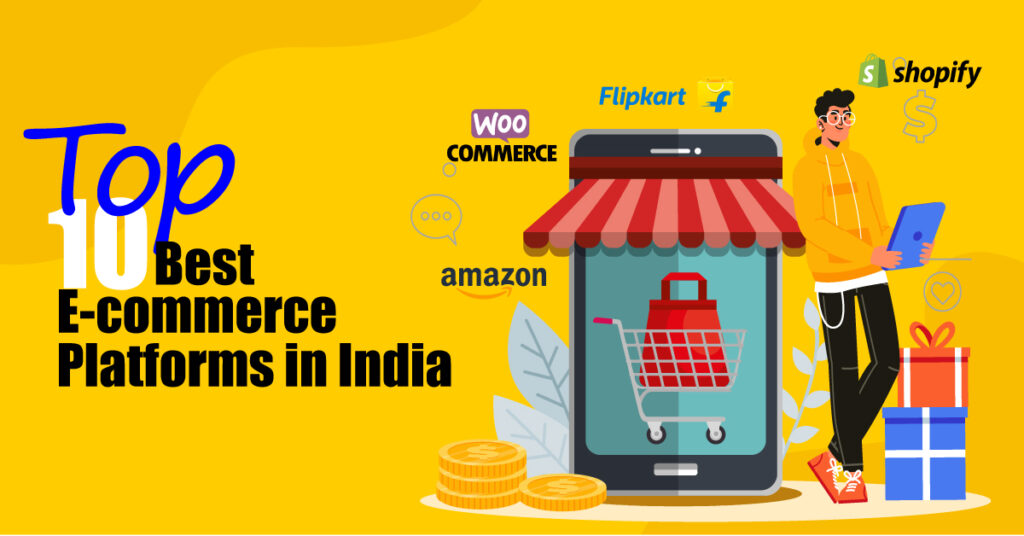
In today’s digital world, selling online has become easier than ever, thanks to e-commerce platforms like Amazon India, Shopify, and WooCommerce. These top e-commerce platforms in India offer a vast array of items, from electronics and clothing to groceries and household essentials, meeting the diverse needs and preferences of shoppers. They serve as online marketplaces where businesses can showcase and sell their products or services to a global audience.
Additionally, they provide a range of tools to manage sales, track customer behavior, and analyze performance data, essentially offering businesses a virtual store with valuable insights to help them grow. Basically, they’re like a one-stop shop for running an online store, making it easier for anyone, whether they’re just starting out or already established, to sell their products or services online.
One of the key factors driving the popularity of e-commerce platforms in India is their user-friendly nature. These provide features for designing storefronts, adding products, processing payments securely, and managing orders. With these platforms, sellers can easily reach a wide audience without extensive technical knowledge, making online commerce simple and accessible. Throughout this guide, we’ll explore the essential features and advantages of e-commerce platforms, discuss the top e-commerce platforms in India, and provide actionable strategies for achieving success in online selling. So, without further ado, let’s get started.
Table of Contents
E-commerce Platforms: How They Work & Key Features
E-commerce platforms in India are online marketplaces where businesses and consumers interact to buy and sell goods and services over the Internet. These platforms serve as virtual storefronts, allowing businesses to showcase their products or services to a wide audience without the need for a physical location. Consumers, on the other hand, can browse through these platforms from the comfort of their homes or on the go via mobile devices, making purchases with just a few clicks.
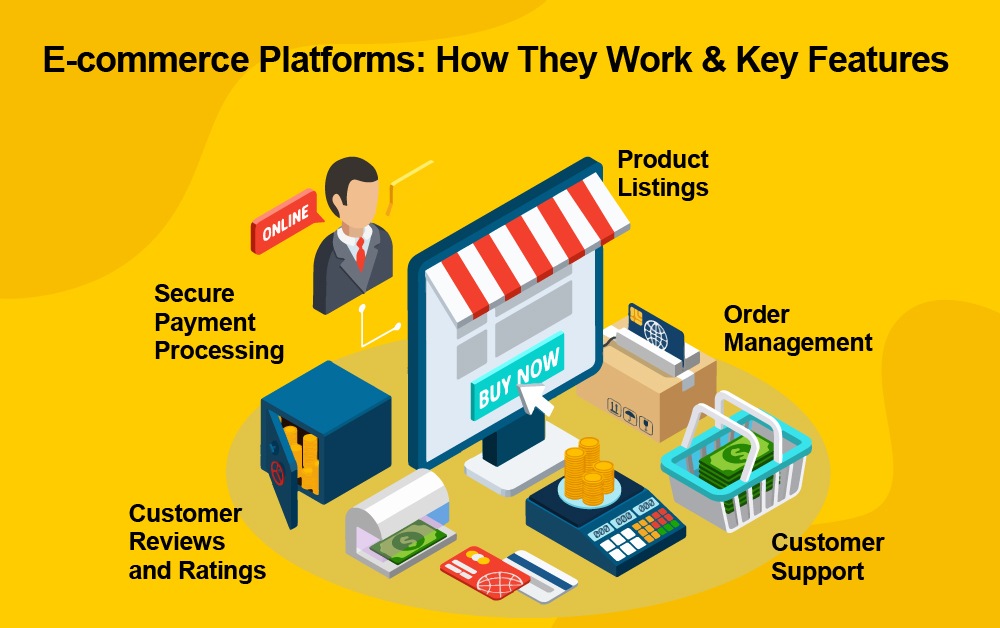
Key features of E-commerce platforms include:
- Product Listings: Sellers can create detailed listings for their products, including images, descriptions, and prices, making it easy for buyers to find what they’re looking for.
- Secure Payment Processing: E-commerce platforms offer various payment options, including credit/debit cards, digital wallets, and cash on delivery, ensuring safe transactions for both buyers and sellers.
- Order Management: Sellers can track orders, manage inventory, and process shipments efficiently, while buyers can view order status and track deliveries in real time.
- Customer Reviews and Ratings: Buyers can leave reviews and ratings for products they’ve purchased, helping other shoppers make informed decisions.
- Customer Support: E-commerce platforms typically provide customer support channels such as live chat, email, or phone support to assist buyers and sellers with any inquiries or issues they may encounter.
Some of the best e-commerce platforms in India include Amazon, Flipkart, and Myntra, which offer a wide range of products across various categories and provide a seamless shopping experience for millions of users nationwide. Beyond convenience and affordability, e-commerce platforms in India have also revolutionized the way goods are delivered. With robust logistics networks in place, these platforms ensure speedy and reliable delivery of products to customers’ doorsteps, even in the most remote corners of the country. This has been particularly beneficial in the wake of the COVID-19 pandemic, where online shopping emerged as a safer alternative to in-person retail.
Benefits of Using E-commerce Platforms
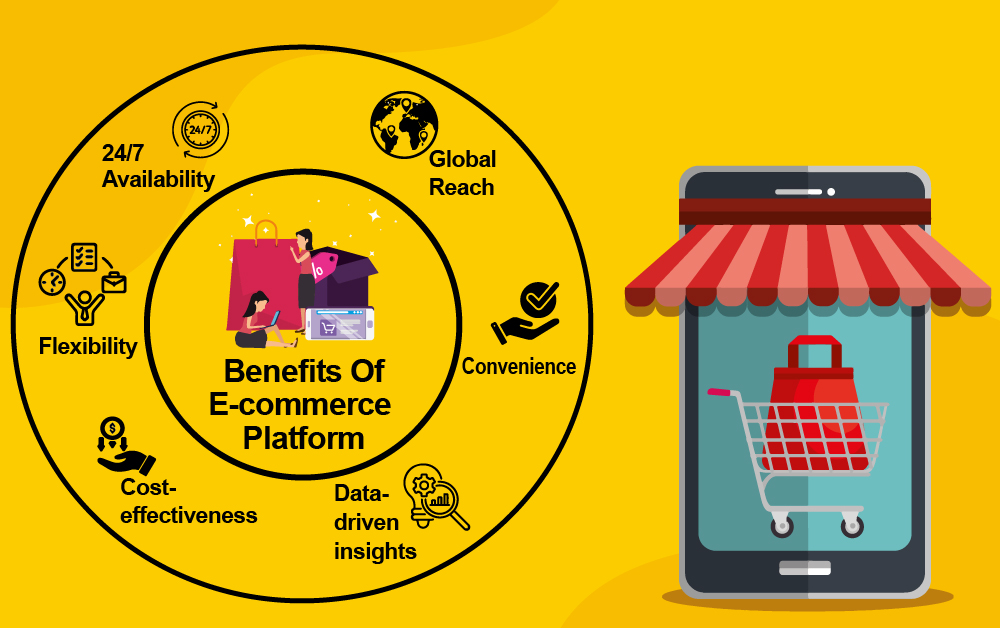
Using an e-commerce platform offers many advantages for businesses. Let’s explore some of the key benefits in simple terms.
- Global Reach: By utilizing e-commerce platforms, businesses can reach customers not only in India but also around the world, expanding their market reach and potential customer base.
- 24/7 Availability: Unlike a physical store with fixed operating hours, an e-commerce platform allows your business to be open 24/7. This means customers can shop whenever they want, leading to increased sales potential.
- Convenience: E-commerce platforms offer convenience to both businesses and customers, allowing transactions to take place anytime, anywhere, without the constraints of traditional brick-and-mortar stores.
- Wider Audience: With digital marketing tools, you can reach a broader audience and target specific demographics more effectively.
- Cost-effectiveness: Compared to setting up a physical storefront, launching an online store on an e-commerce platform is often more cost-effective, requiring lower overhead costs and minimal investment in infrastructure.
- Data-driven insights: E-commerce platforms provide valuable insights and analytics about customer behavior, preferences, and purchasing patterns, enabling businesses to make informed decisions and optimize their marketing strategies.
- Flexibility: With e-commerce platforms, businesses have the flexibility to customize their online stores, experiment with different marketing tactics, and adapt to changing market trends quickly.
In simple terms, e-commerce platforms give businesses the tools they need to expand their reach, increase sales, and better understand their customers, all while keeping costs down and adapting to changing market trends. In other words, e-commerce platforms provide you with the opportunity to start the best small business ideas in India at a cost-effective price point.
Top 10 Best E-commerce Platforms in India
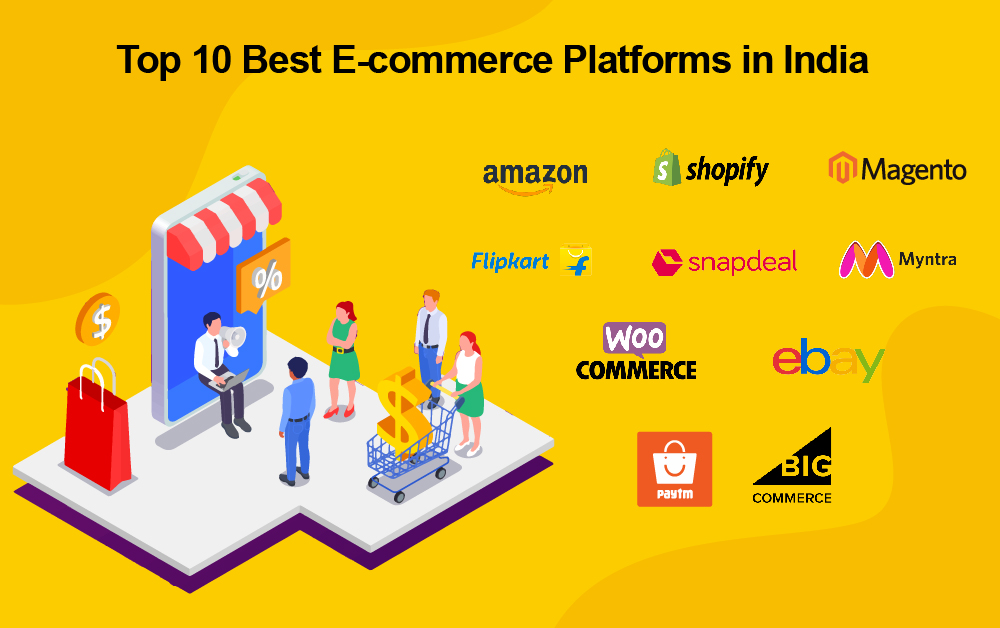
In India, e-commerce platforms have become essential for buying and selling goods online. These platforms offer convenience and accessibility to a wide range of products for consumers and provide opportunities for businesses to reach a broader audience. From household items to electronics, clothing, and more, e-commerce platforms serve as virtual marketplaces where transactions take place digitally. With the growing popularity of online shopping, it’s crucial to explore the top 10 e-commerce platforms in India, highlighting their features, benefits, and impact on the country’s digital economy.
- Amazon India:
One of India’s top e-commerce platforms, Amazon offers a wide range of products and efficient delivery services. It’s known for its extensive customer base and reliable logistics, making it a go-to choice for sellers looking for seamless transactions and broad reach.
- Flipkart:
Flipkart, one of the top e-commerce platforms in India, stands out for its diverse product offerings and user-friendly interface. It introduces innovative features like Flipkart Plus and SuperCoins, enhancing the shopping experience and appealing to both businesses and customers.
- Shopify:
Designed for entrepreneurs and small businesses, Shopify enables the creation of customizable online stores with secure payment options and integrated marketing tools. Its scalability and user-friendly interface cater to businesses of various sizes, allowing them to establish a professional online presence.
- BigCommerce:
A platform known for its robust features and flexibility, BigCommerce empowers businesses to build unique online experiences. From advanced SEO capabilities to seamless integration across different sales channels, it caters to the evolving needs of modern enterprises seeking to grow their online presence.
- WooCommerce:
As a plugin for WordPress, WooCommerce allows businesses to create fully customizable online stores effortlessly. It provides easy management of products and sales data, making it a popular choice for businesses seeking simplicity and versatility in their e-commerce platform.
- Magento:
Magento is an open-source e-commerce platform used to build online stores. It offers flexibility, scalability, and customization options for businesses to create unique shopping experiences. With features like product management, checkout, and payment processing, Magento empowers merchants to manage their online shops efficiently and effectively.
- eBay India:
A prominent player in online auctions and consumer-to-consumer sales, eBay India provides access to a global network of buyers and sellers. Its platform enables sellers to reach a diverse customer base and maximize sales through auctions and fixed-price listings.
- Paytm Mall:
Integrating e-commerce with digital payments, Paytm Mall ensures secure transactions and offers cashback deals and promotional offers to attract customers. It provides a seamless shopping experience with its easy-to-use interface and robust payment infrastructure.
- Snapdeal:
Snapdeal offers a wide variety of products at competitive prices, meeting different consumer preferences. It’s known for its seller-friendly policies and promotional campaigns, making it a popular choice for businesses looking to reach a broad audience in India.
- Myntra:
Myntra is a top fashion destination, offering carefully selected collections and exciting collaborations for a smooth shopping experience. From trendy clothes to timeless accessories, Myntra meets all fashion needs, making it a top choice for style-conscious shoppers.
With these top e-commerce platforms available, you can create an exceptional online shopping experience for your customers and take your business to new heights.
How to Choose the Right E-commerce Platform in India for Your Business
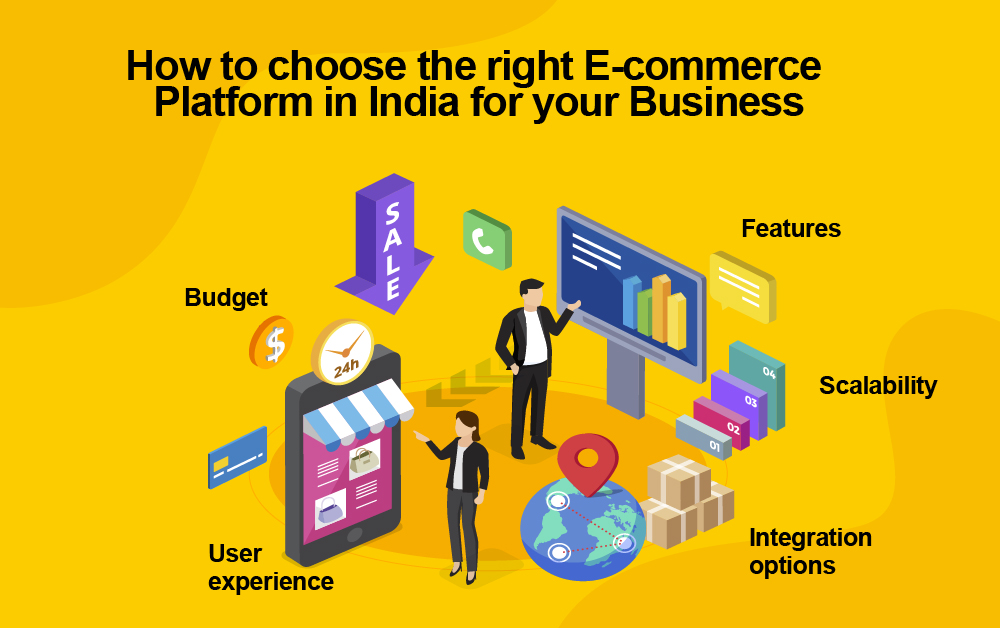
When selecting an e-commerce platform for your business, consider the following factors:
- Budget: First and foremost, consider your budget. Assess the pricing plans and associated fees of each platform to ensure they align with your financial goals. Remember, finding a platform that fits your budget is crucial for long-term sustainability.
- Features: Assess the features and functionalities offered by each platform, such as inventory management, payment gateways, and marketing tools, to determine which ones are essential for your business needs.
- Scalability: Scalability is another key factor to consider. Choose a platform that can grow with your business, allowing you to expand your product range and customer base seamlessly. You don’t want to outgrow your platform too quickly and face the hassle of migrating to a new one.
- User experience: User experience matters greatly in e-commerce. Opt for platforms with intuitive interfaces and smooth navigation, both for you as a merchant managing your store and for your customers making purchases. A seamless user experience can significantly impact your conversion rates and customer satisfaction levels.
- Integration options: Integration options are also crucial. Look for platforms that work well with other tools and services you already use. When tools like accounting software, email marketing platforms, and social media channels work together smoothly, it saves time and makes tasks easier and more efficient.
By considering these factors, you can ensure a smooth and successful online business journey that fits your needs and growth aspirations perfectly.
Strategies for Successful E-commerce Business in India
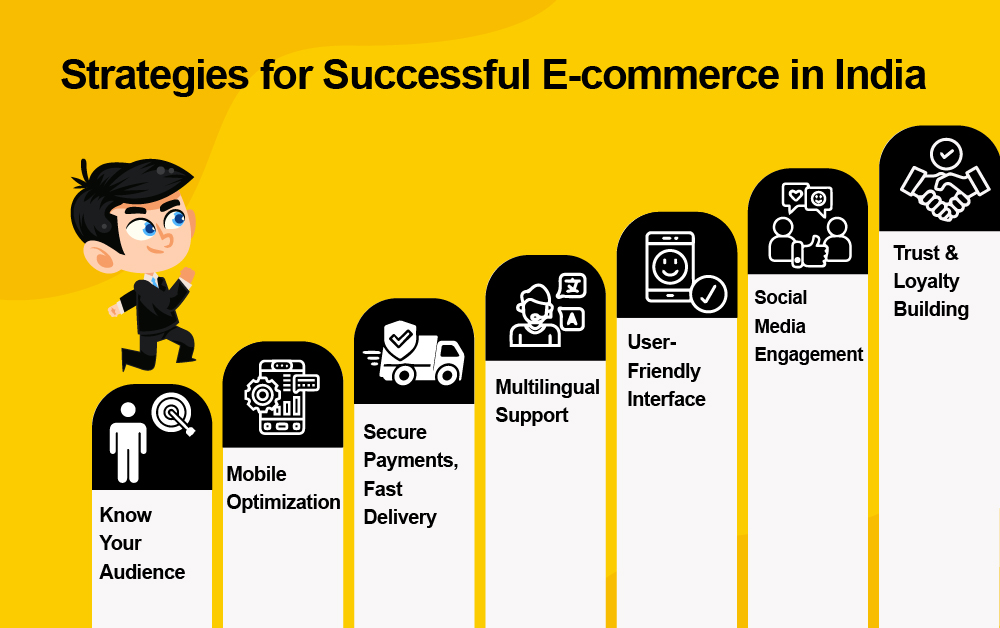
In this overview, we’ll explore the strategies of the best e-commerce platforms in India.
- Understand your audience and their shopping habits: Conduct market research to know your target customer’s preferences, needs, and behavior. Understand what products they are interested in, their preferred payment methods, and their expectations from an online shopping experience.
- Optimize your platform for mobile devices: Given the widespread use of smartphones in India, ensure that your e-commerce platform is fully optimized for mobile browsing. This includes responsive design, fast loading times, and intuitive navigation to provide a seamless shopping experience on mobile devices.
- Provide localised content in regional languages: India is linguistically diverse, so offering content in multiple regional languages can help you reach a wider audience and connect with them on a more personal level. Translate product descriptions, customer support materials, and marketing content into languages spoken in various regions of India.
- Offer secure payment options and fast delivery services: Build trust with your customers by providing secure payment gateways and ensuring the safety of their financial information. Additionally, partner with reliable logistics providers to offer fast and efficient delivery services, meeting the expectations of Indian consumers for timely order fulfillment.
- Ensure excellent customer support in multiple languages: Provide comprehensive customer support services in multiple languages to assist users with their queries, concerns, and issues. This demonstrates your commitment to customer satisfaction and helps build trust and loyalty among your customer base.
- Maintain a user-friendly interface for seamless shopping: Design your e-commerce platform with a clean and intuitive interface that makes it easy for users to find products, add them to their cart, and complete the checkout process without encountering any unnecessary obstacles or confusion.
- Engage customers through social media for visibility and loyalty: Leverage social media platforms to engage with your audience, showcase your products, run promotions, and provide customer support. Building a strong social media presence can increase brand visibility, foster customer loyalty, and drive traffic to your e-commerce platform.
- Gather feedback and make continuous improvements: Actively seek customer feedback through surveys, reviews, and direct communication channels. Utilize this feedback to identify areas for improvement and make continuous updates and enhancements to your e-commerce platform better to meet the needs and expectations of your customers.
- Implement effective marketing strategies across various channels: Develop a comprehensive marketing strategy that utilises a mix of social media, email marketing, search engine optimization (SEO), and online advertising to attract and retain customers. Tailor your marketing efforts to resonate with your target audience and drive traffic to your e-commerce platform.
- Build trust and loyalty to succeed in the Indian e-commerce market: Ultimately, focus on building trust and loyalty with your customers by consistently delivering high-quality products, excellent customer service, and a seamless shopping experience.
Wrapping Up
According to recent data from Invest India and Statista, the future of e-commerce in India looks incredibly promising. In India, the world of online shopping is booming, and it’s set to keep growing. By 2027, a whopping 73.7% of people in India will be using e-commerce platforms to buy things, making it the second-largest market for online buyers globally.
Moreover, the growth rate of top e-commerce platforms in India is impressive, forecasted to be around 14.11% annually between 2023 and 2027. Plus, the future of online shopping is looking bright in smaller cities too, as about 88% of new online shoppers are expected to come from Tier 2 and beyond by 2030.
E-commerce platforms in India have transformed the way businesses operate in India, offering convenience, accessibility, and vast growth opportunities. As India moves forward digitally, online shopping websites will become even more important for changing how we buy things. They help businesses reach more people. To make the most of online shopping, it’s important to use new ideas, focus on making customers happy, and keep up with what people want. This will help e-commerce grow and be even better in India.



